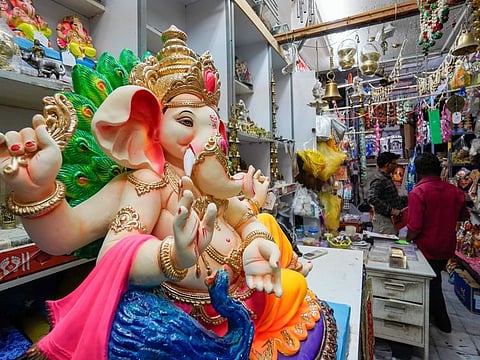Hindu temple in UAE sends out advisory for community
Avoid immersion and choose bio-degradable idols, devotees told ahead of popular festival

Dubai: The Hindu temple in Bur Dubai has sent out an appeal to those celebrating the forthcoming Ganesh Chaturthi festival, which falls on August 22, to desist from large gatherings during the festival and noisy processions for immersion. This advisory has been sent out in view of the COVID-19 pandemic and its fallout.
It is possible to choose biodegradable idols of the deity that are available in Dubai. These idols do not require immersion. Every year, the ten-day festival is marked by loud and noisy processions leading to the sea, where people hire private boats to immerse the idols at the conclusion of the festivities.
Speaking to Gulf New about the issue, Dr Omar Al Muthana, CEO of Regulatory and Licensing at the Community and Development Authority, Dubai, said: “After the recent reopening of the places of worship in Dubai, we encourage all community members to adhere to all the guidelines issued by the Supreme Committee of Crisis and Disaster Management while visiting places of worship in order to ensure the health and safety of our community and to support the government’s efforts in curbing the spread of the pandemic.”
Adapting to the ‘new normal’
Gopal Kokani, the general manager of the Bur Dubai Hindu temple, told Gulf News: “We are working in close cooperation with all the authorities — Dubai Police, Dubai Municipality and the Community Development Authority. While people need to understand that any kind of congregation or noisy procession will absolutely go against the protocols of social distancing, we, as a community, also need to understand that it is not eco-friendly in our times to immerse idols in the sea.”
Bio-degradable idols and no immersion
Kokani further added that the temple had already begun discouraging people from keeping large idols at home during the impending festival. “The temple has about eight-ten priests on call who can go to people’s homes to assist with any rituals. As people have begun calling us, we have already started sending out the message to either desist from installing idols or go for eco-friendly ones, which can be dissolved into clay in a bucket of water. This water can then be used to water plants. In some cases, the clay of the idol contains seeds of the holy basil plant or some flowering plant. After the festival is over, these idols can be recycled back into the soil and these seeds can grow into plants. We want people to make these eco-friendly choices.”
Raju Shroff, the trustee of the Hindu temple in Bur Dubai, also appealed to the community to adapt, desist from noisy celebrations and respect the laws of the land.
Places to obtain eco-friendly idols
Many shops at the Bur Dubai temple premises have begun stocking up on these bio-degradable Ganesha idols. One can place orders in advance. Gulf News spoke to some vendors in the narrow alley leading to the temple. Most vendors have already stocked up on the idols and are reporting brisk sales. One such vendor told Gulf News: “These idols are made of pure mud and painted in vegetable dyes and baked in kilns. Our smallest idol is about five inches, which costs Dh25, while the tallest is 13.5 inches, which can cost up to Dh150 depending upon the intricacy. Our regular customers have already placed their orders. Many are opting for eco-friendly idols. After the festival, these can dissolved in no time in a bucket of water, which can then be used to water plants. Last year, we had clay idols with plant seeds. This year, the dissolvable variety came in earlier and people have begun placing orders.”
What is Ganesh Chaturthi?
The annual ten-day festival marking the birth of the popular Elephant-headed Hindu deity Ganesha, which falls on the fourth day of the month of Bhadra Pada according to the lunar Hindu calendar, is widely celebrated in India and beyond. Ganesha is a symbol of prosperity and wisdom and is also known to remove obstacles on the path to progress. This year, the festival falls from August 22-31.
People consider it auspicious to install an idol of Ganesha at home either for two, three, five or maximum ten days during the duration of the festival. On the 11th day, which falls on September 1, the festival will conclude with the immersion of the idol in a waterbody. People begin the immersion from Day Two, depending upon the number of days for which they keep the idol installed. But the 11th day is the final day of immersion and families often go in large groups, bidding a symbolic farewell to the deity.









